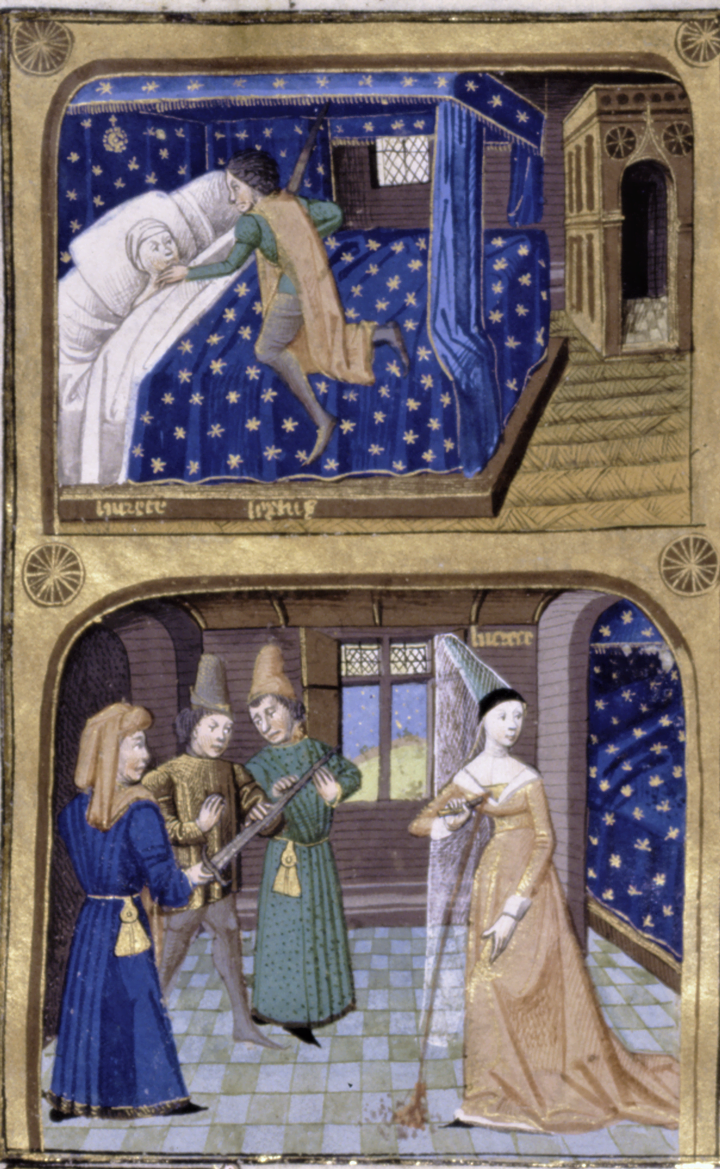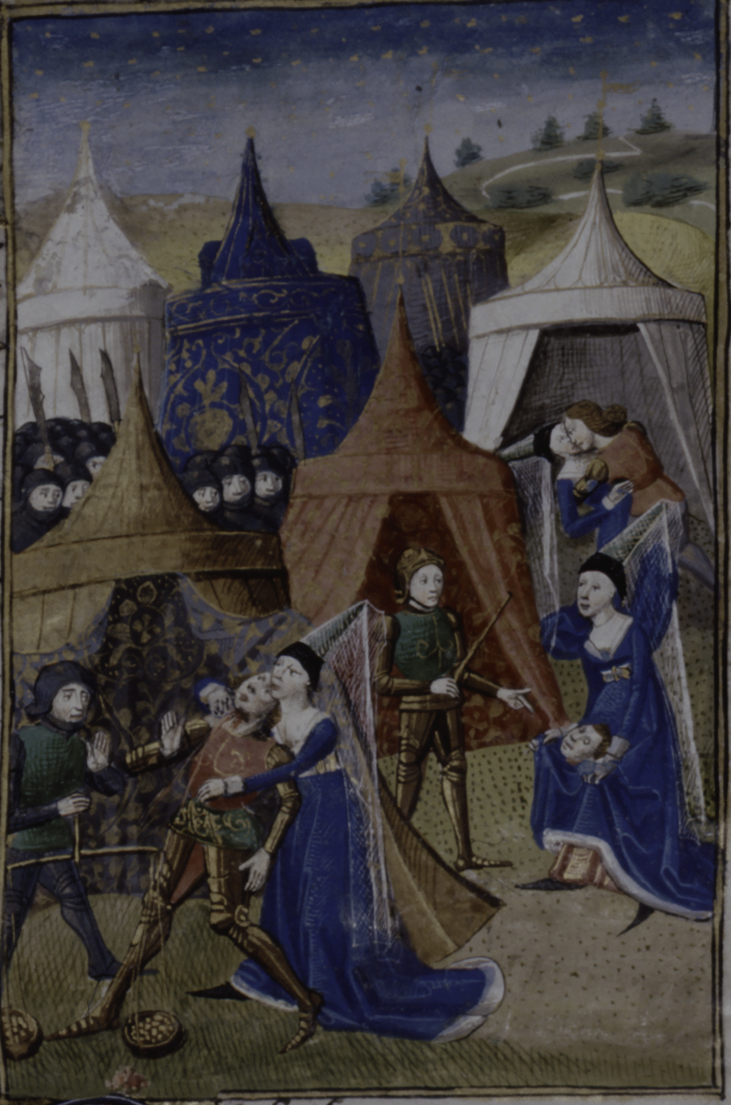This is part 1 of The Public Medievalist‘s special series: Gender, Sexism, and the Middle Ages, by Lucia Akard. You can find the other parts of our series here.
When people ask me what I study, I try to reduce it down to “the Middle Ages.” Because nothing stops a dinner conversation faster than saying you study survivor responses to rape in medieval France.
No one wants to talk about rape. It make them uncomfortable, squeamish even. Despite the recent #MeToo movement, people still don’t want to talk about it. And they often can’t imagine why I—why anyone—would study such a thing. But the question I get most often isn’t typically about the personal difficulty of studying horrific violence. Instead, I get: “Well didn’t it just happen all the time back then?”
There are a few ways I answer this. First of all, given how scattered the legal record for France is during the 14th and 15th centuries, it’s difficult to come up with a figure for how many people experienced rape in their lifetime (like the 1 in 6 figure commonly cited for the proportion of American women who do today). Moreover, rape certainly happened frequently, but the medieval definition of rape was much narrower than modern feminist definitions, and so finding evidence in the archives can be difficult. Rape was also under-reported, as it is now. But perhaps the best answer I could give, and the one I should start giving, is this: “Well, it happens all the time now too.”
Medieval Rape: Too Common to Matter?

People who ask this question are implying that medieval rape is not worth studying because it was simply a fact of life. In saying that it “just happened all the time back then,” or in making similar assumptions, the modern is placed ahead of the medieval. The Middle Ages are assumed by many to have been backwards and brutal. In comparison, the modern era is cultured and enlightened. This is vastly untrue, but the myth persists nevertheless. As a result, many people assume that sexual violence was so widespread in the Middle Ages that it ceased to matter. What follows from this is the idea that rape happened so frequently that women began to expect it, and even accept it as a fact of life. But the popular belief that rape was widespread, expected, and acceptable in the Middle Ages has an even more ominous implication: that sexual violence against women is somehow a natural state of human affairs.
The fact is, women have been speaking up and speaking out about rape for a long, long time, and it still feels as if no one is listening. The #MeToo movement was started in 2007 by feminist Tarana Burke as a way to show solidarity with black women and girls who had experienced sexual assault. It has since exploded in popularity. In 2017 the hashtag gained popularity on twitter as survivors of sexual assault and harassment began using it as they shared their stories. Celebrity features in the movement, with film mogul Harvey Weinstein being one of the first accused, by over 80 women. The likes of Kevin Spacey, Ed Westwick, and many other have been accused of sexual harassment and sexual violence by people sharing their stories under this hashtag. Larry Nassar, a prominent doctor in the field of women’s gymnastics, was accused of sexual assault by over 150 young women and girls. Junot Diaz, who penned an article in The New Yorker about his own experience with rape, has now been accused by one woman of forcibly kissing her and by two others of aggressive behavior. Politicians, including Democratic senator Al Franken, former Republican senatorial candidate Roy Moore, and former president George H.W. Bush, have been accused of sexual misconduct, sexual harassment and assault of underage girls, and inappropriate touching, respectively.
And of course, recently confirmed Supreme Court Justice Brett Kavanaugh has been accused of attempted rape by Dr. Christine Blasey Ford, sexual misconduct by Deborah Ramirez, and participating in gang rape by Julie Swetnik.
#MeToo has given victims and survivors a space to share their stories. Though the court of public opinion is not always kind or receptive, #MeToo has demonstrated that there is strength in numbers. And it has also started a growing, worldwide, much-needed conversation about sexual assault and rape. This conversation particularly focuses on how ubiquitous rape, sexual assault, and sexual harassment are in the world today: almost every woman you know has a story. In this way, women’s lives are not so different in the present as they were in the past.
The Medieval Resistance

Plenty of women spoke out against rape in the Middle Ages, though just like now, they had to struggle to be heard. Medieval courts often let rapists go with little explanation and placed the burden of proof on the victim, as demonstrated by several cases in this register from 14th century Paris. In one instance, chambermaid Eudelot la Picarde accused her employer Guillaume Damours of raping her, and the court tasked her with producing witnesses, to which she responded that there were none. La Picarde failed to appear in court at the next date (perhaps because she knew she had no proof) and Damours was absolved. In another case, Jacqueline la Cyrière was accused of luring ten-year-old Jeannette Bille-heuse into her home and then aiding a Lombard soldier in raping the child. The court does not explain what happens to the soldier who actually committed the crime of rape, and focuses all its attention on La Cyrière, who is sentenced to burn at the stake.
A few cases stand out as exceptions. In 1385, Perrote Turelure was pardoned via a letter of remission by the king’s court for killing a squire named Brunet. Brunet had been pursuing her relentlessly, and eventually broke into her home and tried to rape her. Turelure killed him in order to avoid being raped. It is stated that Turelure “refused for fear of the harm done to her body and rape” and “feared the dishonor, shame and corruption of the virginity of her body and to be dishonored or dead.”
At first, Turelure’s case looks like a success story. But why was she pardoned, and why was her use of physical force against her attacker such a crucial factor?
The clearest rape law that we have from medieval France stresses the importance of a woman forcefully resisting rape: “To force a woman is when someone has carnal intercourse by force with a woman against the will of said woman and when she does everything in her power to defend herself.” (This definition bears startling similarity to the one used by the FBI’s Uniform Crime Reporting system prior to 2013). By this medieval definition, if a victim did not resist verbally and physically, there was little way to prove she had been raped. In court, a victim would be questioned repeatedly to gain a sense of how physical and verbal her resistance was. Turelure’s resistance was considered so valiant that the king’s court pardoned her for the murder of her attacker and attempted to clear away any of the damage done to her reputation by the attempted rape (underscoring how suffering sexual violence could ruin a woman’s life).
Some women found their reputations so damaged by having been raped that they were forced into prostitution; there was little other space for them in society. If they could not get married due to the loss of their virginity, then they had to find the means to support themselves elsewhere. Turlure’s response to the rape was perhaps only acceptable because of who she was—a woman with an honest reputation who in the court’s eyes understood the value of her virginity and took steps to protect it.
Similarly, in 1386, Marguerite de Thibouville spoke of her lengthy resistance to rape to the Paris Parlement court. She testified that she repeatedly cried out, beat her attacker Jacques le Gris with her fists, and barricaded herself in another room. She is said to have “continued to scream” throughout the attack and Le Gris is quoted as saying that he “never met a stronger woman.” Her strong resistance, and the fact that the attacker broke into her home, is likely why the court granted her husband’s wish for a trial by combat, during which he executed Le Gris. De Thibouville’s forceful resistance was also a marker of her good, honest character, and her chastity as a married woman. Turelure’s case demonstrates something similar, for there is hardly a stronger sign of resistance than killing one’s attacker.
A Medieval Rape Catch-22

These two cases reveal an apparent contradiction in medieval French society, and, I think, in our own as well. If it is acceptable for a woman to kill the man who has attempted to rape her, then it follows that the rapist has committed an egregious wrong-doing, justifying his murder. So far, so good (more or less). Brunet bears the guilt for what occurs, not Turelure—despite the fact that he is the one who ends up dead. One would think this relationship could be true in the reverse: since Brunet, or any rapist, bears the blame for the violent crime, then the victim shoulders none of it. In other words, victim blaming shouldn’t be possible when the rapist is explicitly held accountable both by the would-be victim and the court. But we know that Turelure’s and De Thibouville’s cases are the exception rather than the rule, and more often than not medieval women were blamed for the crime committed against them.
Although these women may sound heroic (and in some ways they certainly are), there is a darker side to female self-defense. Rapist seek to subjugate their victims, making them relinquish control over their bodies and wills. Medieval courts demanded that the victims be active enough participants in the rape to not only resist it thoroughly but to stop it from happening at all. Then, as now, women were expected to be good rape victims. Turelure was only pardoned because she proved, within a shadow of a doubt, her desire to protect her virginity, and thus her status as an honorable woman.
But what happened to women whose resistance wasn’t as successful or forceful? And what happens to them now?
In asking women to resist rape forcefully, we acknowledge it as a heinous crime or violent action that should thus be met with equal violence from its victims. And yet, we do not treat rape like a heinous crime. We have simultaneously classified rape as something terrible—the worst thing that can happen to a woman—and then we continuously fail to treat it as such. For example, despite how “convincing” and “persuasive” Dr. Ford’s testimony in front of the Senate Judiciary Committee was, despite how eager to please she may have seemed, despite how thoughtfully she answered each question—Brett Kavanaugh was still confirmed. A man’s career was prioritized over a woman’s clear and honest pain. Even in the era of #MeToo, few rapists are held accountable, and a survivor’s trauma is not enough to stop a man from holding one of the highest positions in the American government.
And people still have a tendency to question survivors endlessly when they do come forward. Dr. Ford’s memory was called into question, she was asked why she didn’t tell her parents what had happened, she was asked if she was truly afraid of flying, she was asked if she had a political motive for coming forwards. Of course, Dr. Ford agreed to be questioned, and it was the job of prosecutor hired to do so. But what of the many survivors who watched the hearing and were reminded of the times when they had been questioned about their stories, when their credibility had been picked apart, and when they had been accused of seeking attention? When we interrogate survivors about their stories, what we are really asking is “Are you the type of woman who could be raped? Are you the type of woman who would lie? Was what you experienced actually even rape?”
Take the case of Aziz Ansari. In 2018, the comedian known for his roles in Parks and Recreation and Master of None, was accused of sexual misconduct by a woman identified as Grace. According to an account of the encounter published on babe.net, Grace and Aziz went on a date, and afterwards went to his apartment. Grace reported that almost immediately upon entering the apartment Aziz began kissing and undressing her, and told her he was going to get a condom. Grace reported having said, “Whoa, let’s relax for a sec, let’s chill.” But, allegedly, Aziz didn’t. He followed her around the room as she repeatedly tried to get away from him, and he ignored the fact that she stopped responding to his advances.
Grace reported that she explicitly said she “didn’t want to feel forced.” And allegedly Aziz reacted in what seemed like an understanding manner, saying that it was only fun if they were both enjoying it. And yet, he reportedly did not stop his advances, pointing at his crotch for her to perform oral sex on him, despite the fact that moments earlier Grace reported she had explicitly expressed discomfort. It allegedly continued like that, with Grace voicing and showing her resistance and Aziz pursuing her anyways, until she eventually left. She reported crying in the taxi on the way home.
Whether this was a case of sexual assault was not universally agreed upon by the public. In particular, Bari Weiss wrote an opinion piece titled “Aziz Ansari Is Guilty. Of Not Being a Mind Reader,” in which the she accused Grace of not saying no loudly enough and categorized what happened to her as “bad sex.” Headline News host Ashleigh Banfield said, “By your own clear description, this was not a rape, nor was it a sexual assault. By your description, your sexual encounter was unpleasant,” and suggested that Grace should have left Aziz’s apartment as soon as she felt uncomfortable.
A Forceful Resistance
The reactions to Grace’s case remind me of the medieval rape laws that classified the crime as necessarily violent and made the woman’s forceful resistance key in proving a crime had occurred. Women should not have to scream “No!” at the top of our lungs in order for our sexual partners to listen to us. Nor should we, like Perrote Turelure was, be forced to physically attack our would-be rapists. How was Grace to know that Aziz would have let her leave had she tried sooner? He seemed to ignore every other physical and verbal cue she gave him. What is to say that he would not have become violent or angry? What is to say that he would not have outright raped her? Grace reported feeling unsafe and uncomfortable, the clear victim in this situation. It was up to Aziz not to sexually assault her, not for Grace to avoid it.
Women have been saying “Me too” for centuries. And we may think that now is the moment we are finally beginning to listen, that now is the time of revolution. But when we start demanding a specific type of resistance from victims of sexual assault, and when we continuously put them on trial at the court of public opinion, we prove ourselves to be no better than medieval courts. We prove ourselves to be medieval when we demand women demonstrate their extreme physical resistance to rape as well as their honest reputations in order to be believed.
The point is not that we should be better than medieval people, but that it is a fallacy to continue to view ourselves as such. It has been shown, time and again, that the worst aspects of the Middle Ages, at least in terms of sexual violence, have endured thoroughly, quietly, and with little change.
If we want to be better than our medieval forebears, and if we want to be better than we currently are, we need to start by listening to survivors without judgment.
If you or someone you know has experienced rape or sexual assault, don’t hesitate to get help. Contact RAINN (Rape, Abuse & Incest National Network) 800.656.HOPE, online.rainn.org.
Me Too Movement: https://metoomvmt.org/
If you enjoyed that article, please share it with your history-loving friends on Facebook, or on Twitter! And be sure to subscribe here to receive every new article from The Public Medievalist the moment it launches.




